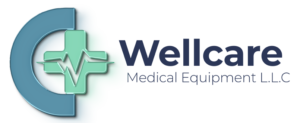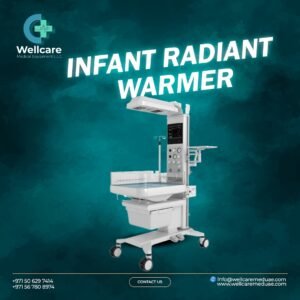Cardiology Equipment Supplier in United Arab Emirates
Well Care Medical Equipment LLC plays a pivotal role as a cardiology equipment supplier across the United Arab Emirates (UAE), including key emirates such as Dubai, Abu Dhabi, and Sharjah. Their range of high-quality medical devices is essential for diagnosing and treating various cardiovascular conditions, which are a leading cause of death globally. The company supplies advanced equipment like electrocardiogram (ECG) machines, cardiac monitors, defibrillators, and stress test systems, enabling healthcare professionals to accurately assess and monitor heart function. This makes Well Care a trusted partner for hospitals and clinics aiming to deliver precise and timely cardiac care. In Abu Dhabi, the UAE’s capital and a hub for advanced healthcare services, Well Care Medical Equipment supports the growing demand for state-of-the-art cardiology solutions. With a focus on preventing and treating conditions such as heart attacks, arrhythmias, and congestive heart failure, healthcare providers rely on Well Care's equipment to enhance patient outcomes. By offering cutting-edge technology, the company aids in the early detection of heart diseases, allowing for effective intervention and treatment, which is crucial for the growing population in the region. In Sharjah and other northern emirates, where healthcare infrastructure is expanding, Well Care Medical Equipment’s cardiology devices are equally essential. The increasing focus on improving healthcare access in these areas has boosted demand for high-quality diagnostic and therapeutic equipment. Well Care’s contributions help medical institutions deliver vital cardiology services, bridging gaps in healthcare delivery and ensuring that patients across the UAE receive comprehensive heart care. The company's commitment to excellence and innovation helps position the UAE as a leader in advanced cardiovascular treatment in the Gulf region.
Well Care Medical Equipment LLC’s role as a supplier of cardiology equipment in the UAE:
1. Advanced Diagnostic Equipment
Well Care Medical Equipment LLC provides a range of diagnostic cardiology equipment that plays a key role in identifying heart conditions at an early stage. This includes advanced machines such as electrocardiographs (ECG), stress test systems, holter monitors, and echocardiography machines.
Electrocardiographs (ECGs): These machines are vital in measuring the electrical activity of the heart. They help in detecting irregular heartbeats, arrhythmias, and other potential cardiac issues. Well Care supplies various types of ECG machines, from portable versions to advanced, multi-channel systems used in hospitals.
Echocardiography Systems: These ultrasound-based devices create images of the heart to analyze its structure and function. Well Care supplies 2D, 3D, and Doppler echocardiography machines, which are crucial in diagnosing heart valve issues, congenital heart defects, and other cardiovascular diseases.
2. Therapeutic and Monitoring Equipment
In addition to diagnostic tools, Well Care Medical Equipment LLC provides therapeutic and monitoring devices that are essential for patient care in cardiology wards. These include defibrillators, pacemakers, and patient monitoring systems that ensure patients with heart conditions receive the appropriate treatment and continuous observation.
Defibrillators: Well Care offers both manual and automated external defibrillators (AEDs), which are crucial for emergency situations like sudden cardiac arrest. These devices deliver controlled electric shocks to restore normal heart rhythms.
Pacemakers and Implantable Cardioverter Defibrillators (ICDs): Well Care supplies these life-saving devices, which are implanted into patients to help regulate their heart rhythms. These devices are critical for patients with severe arrhythmias or heart failure.
Cardiac Monitors: For continuous observation of heart activity in critical care units, Well Care supplies multi-parameter patient monitoring systems. These systems provide real-time data on a patient’s heart rate, oxygen saturation, and other vital signs, enabling healthcare professionals to monitor cardiac patients closely.
3. Interventional Cardiology Equipment
Well Care Medical Equipment LLC also supplies advanced equipment for interventional cardiology procedures, which include minimally invasive treatments for heart conditions. This includes angiography systems, catheterization lab equipment, and stents used in procedures like angioplasty.
Angiography Systems: These systems use X-ray technology to visualize blood vessels in the heart, allowing cardiologists to diagnose blockages or abnormalities in the coronary arteries. The precise imaging provided by these machines is essential for planning and conducting interventions such as stent placements.
Cardiac Catheters and Stents: For interventional procedures like angioplasty, Well Care supplies the latest catheters and drug-eluting stents. These devices are used to open up narrowed arteries, ensuring proper blood flow to the heart.
4. Non-Invasive Cardiac Testing Equipment
In modern cardiology, non-invasive testing has become increasingly important due to its safety and effectiveness. Well Care Medical Equipment LLC offers a range of non-invasive cardiology equipment that helps in diagnosing heart conditions without requiring surgical procedures.
Stress Test Systems: These systems are used to monitor how the heart functions under physical stress (like exercise). They help in diagnosing conditions such as coronary artery disease and are often used as part of routine heart health assessments.
Holter Monitors and Ambulatory Blood Pressure Monitors (ABPM): Well Care supplies Holter monitors, which record the electrical activity of the heart over a 24-hour period, allowing doctors to identify intermittent arrhythmias that might not be detected in a short ECG. Ambulatory blood pressure monitors help track a patient’s blood pressure throughout the day, providing insights into hypertension and its effect on heart health.
5. Comprehensive Cardiology Solutions and After-Sales Support
One of Well Care Medical Equipment LLC’s key strengths is its ability to offer comprehensive cardiology solutions that cater to the specific needs of healthcare providers. They offer installation, training, and maintenance services, ensuring that hospitals and clinics can operate the equipment efficiently.
Training and Support: Well Care provides extensive training to medical staff on the proper usage of cardiology equipment, ensuring healthcare providers are well-equipped to handle the technology. This is especially important for complex machines like echocardiography systems and defibrillators.
After-Sales Services: Well Care offers a full range of after-sales services, including regular maintenance and technical support. This ensures that all cardiology equipment continues to function at optimal levels, minimizing downtime and ensuring that hospitals can provide uninterrupted cardiac care.
As a leading supplier of cardiology equipment in the UAE, Well Care Medical Equipment LLC plays a crucial role in enhancing the quality of cardiac care. From advanced diagnostic tools like ECGs and echocardiographs to life-saving therapeutic devices like defibrillators and pacemakers, Well Care’s products enable healthcare providers to offer state-of-the-art care to cardiac patients. With a focus on high-quality equipment, comprehensive solutions, and robust after-sales support, Well Care helps hospitals and clinics provide timely, efficient, and accurate treatment for cardiovascular diseases, which are among the leading causes of death globally.
What types of cardiology equipment does Well Care Medical Equipment supply?
We provide a wide range of cardiology equipment including ECG machines, defibrillators, patient monitors, echocardiography systems, Holter monitors, stress test systems, and other diagnostic and treatment devices.




